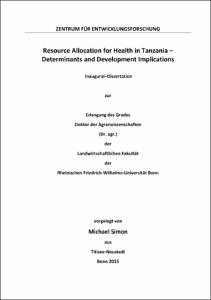Simon, Michael; Tsegai, Daniel; Fleßa, Steffen: Intersectoral health action in Tanzania : Determinants and policy implications. Bonn: Center for Development Research (ZEF), University of Bonn, 2012. In: ZEF-Discussion Papers on Development Policy, 172.
Online-Ausgabe in bonndoc: https://hdl.handle.net/20.500.11811/12228
Online-Ausgabe in bonndoc: https://hdl.handle.net/20.500.11811/12228
@techreport{handle:20.500.11811/12228,
author = {{Michael Simon} and {Daniel Tsegai} and {Steffen Fleßa}},
title = {Intersectoral health action in Tanzania : Determinants and policy implications},
publisher = {Center for Development Research (ZEF), University of Bonn},
year = 2012,
month = dec,
series = {ZEF-Discussion Papers on Development Policy},
volume = 172,
note = {The tremendous human resource and economic burden of HIV/AIDS, malaria and diarrhoeal diseases is well acknowledged in many developing countries. Most of these diseases have multifaceted causes such as malnutrition, the consumption of contaminated water or poor education. Thus, cross-sectoral action is needed to lower the burden of disease in the long run.
However, little has been done to investigate the causal relationship between investments in ‘health related’ sectors and the reduction of disease prevalence. This paper aims at analysing the marginal health returns to cross-sectoral government spending for the case of Tanzania. For this, the normative assumption is to maximise the amount of Disability Adjusted Life Years (DALYs) averted per dollar invested. A Simultaneous Equation Model (SEM) is developed to estimate the required elasticities. The results of the quantitative analysis show that the highest returns on DALYs are obtained by improved nutrition and access to safe water sources, followed by sanitation. Looking at the impact of indirect factors, the health effect of investments in mother education exceeds the effect of additional short- and long-term public spending on water.},
url = {https://hdl.handle.net/20.500.11811/12228}
}
author = {{Michael Simon} and {Daniel Tsegai} and {Steffen Fleßa}},
title = {Intersectoral health action in Tanzania : Determinants and policy implications},
publisher = {Center for Development Research (ZEF), University of Bonn},
year = 2012,
month = dec,
series = {ZEF-Discussion Papers on Development Policy},
volume = 172,
note = {The tremendous human resource and economic burden of HIV/AIDS, malaria and diarrhoeal diseases is well acknowledged in many developing countries. Most of these diseases have multifaceted causes such as malnutrition, the consumption of contaminated water or poor education. Thus, cross-sectoral action is needed to lower the burden of disease in the long run.
However, little has been done to investigate the causal relationship between investments in ‘health related’ sectors and the reduction of disease prevalence. This paper aims at analysing the marginal health returns to cross-sectoral government spending for the case of Tanzania. For this, the normative assumption is to maximise the amount of Disability Adjusted Life Years (DALYs) averted per dollar invested. A Simultaneous Equation Model (SEM) is developed to estimate the required elasticities. The results of the quantitative analysis show that the highest returns on DALYs are obtained by improved nutrition and access to safe water sources, followed by sanitation. Looking at the impact of indirect factors, the health effect of investments in mother education exceeds the effect of additional short- and long-term public spending on water.},
url = {https://hdl.handle.net/20.500.11811/12228}
}









